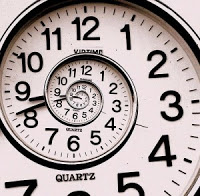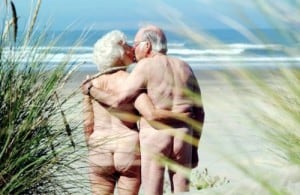Posts Tagged ‘aging’
“Getting Older, Getting Better,” guest post by Charlie Glickman, PhD
One of my favorite sex nerds, Dr. Debby Herbenick, recently retweeted something that I’ve been thinking about for a while:
True. @hotaction: “Everyone should spend some time looking at photos of naked old people because that’s what the future looks like.”
— Dr. Debby Herbenick (@mysexprofessor)
Today is the 20th anniversary of the date that I met my partner. In the last two decades, we’ve both changed a lot. We’re both much more secure and solid in who we are. We’ve grown and challenged each other to overcome many of the habits that caused friction in our lives and in our connections with other people. We’ve learned many, many ways to support our relationship. And yes, our bodies have changed, too. While I’d love to have the physical resilience that I used to have, I wouldn’t trade my current life for the one I had back then. I needed that ability to bounce back- without it, I never would have survived the drama I caused myself and others.
After two decades with Elizabeth, I think she’s more beautiful than ever before and I’m more drawn to her than I could have imagined when we first met. And I think about the many people who stop being attracted to their partners and trade them in for someone younger. This seems to be more common for men, but I’ve also seen women do the same thing in increasing numbers. While I’m fully supportive of people creating the relationships they want and ending them when they no longer serve them, I can’t help but wonder about our tenacious grip on the idea that younger is better and how that affects things.
In a world that only presents the latest 18-25 year olds as sexy, it’s a challenge to not compare oneself or one’s partner with that fantasy. Personally, I’ve found that became easier when I stopped watching TV and reading the drivel that passes for news (and don’t even get me started on popular magazines). But it takes more than that. Every time you compliment someone’s appearance by telling them that they look young, you’re reinforcing the idea that we lose value as we age. I feel sadness around that because it encourages us to deny our histories, to pretend we’re something we aren’t, and to create an image of who we wish we were rather than celebrating who we’ve become. And let’s not forget that many of the cosmetic treatments to make us look younger don’t work all that well and are promoted with ads that are photoshopped like crazy. My willing suspension of disbelief snapped a long time ago.
Maybe I’ll have something different to say in another 20 years. But right now, I think that the physical expression of experience and growth is incredibly sexy. It’s an outward manifestation of the individual’s evolution. Personally, I find that much more attractive than someone who strives to look like they’re still 23. This is something that many of us have to practice. When the only images that we see define attractiveness as equivalent to youth, it can be difficult to not make comparisons.
I’ve spoken with quite a few people who are convinced that nobody will want to have sex with them because they have grey hair, or wrinkles, or scars, or stretch marks, or health concerns, or any of the other effects of age. I feel sadness that they’re so sure that they’re unattractive to others because they’re unattractive to themselves. I wonder how much of that comes from never having thought of people over a certain age as desirable. I wonder how much of that comes from the fact that so much of the breathless commentary about attractiveness (especially female attractiveness) is tied up in how young someone looks. What a waste of the incredible beauty and wisdom that surrounds us, if only we could see it.
If Elizabeth and I are fortunate, we will have lots more time together. And someday, we may get to be like the people in this photograph. I look at it and see something to be celebrated. I also know that many people will look at it and feel disgust, shame, or squicked. So what are you going to do when you get to be that age? How are you going to feel about yourself or your partner(s)? Will you be able to be naked with your partner without feeling self-disgust or shame?
The time to start thinking about older people being sexy is right now. This is the time to stop shaming elders who express desire or who want to have sex. This is the time to stop mocking their bodies or describing them negatively. When you get older, you’ll be struggling with a lot of cultural momentum and the longer you go along with it, the harder it’ll be when you finally get around to resisting (if you do). That’s especially true for women and their partners, given the extra pressure and judgement attached to youth and attractiveness for women. But really, we’re all affected by the idea that younger is better.
Instead of thinking of someone as “looking good for their age,” how about simply letting them “look good”? Instead of telling someone that they look so young, compliment them on something specific like their hairstyle or their outfit. And instead of saying insulting things about older people’s sexuality, acknowledge the feeling as your own judgment. There’s a huge difference between “that’s gross” and “I feel discomfort.” The more we can change how we think and feel about elders and sexuality, the better off we’ll be if and when we get there.
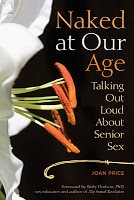 I also highly recommend Joan Price’s book Naked at Our Age: Talking Out Loud About Senior Sex. Even if you’re not there yet, there’s a good chance that you will be and many of the sexual concerns that can arise are much easier to deal with when you aren’t surprised by them. Joan interviewed and quoted lots of medical professionals, sex educators, and therapists, so it’s like you’re getting the benefit of a whole panel of experts in one book. It’s amazing.
I also highly recommend Joan Price’s book Naked at Our Age: Talking Out Loud About Senior Sex. Even if you’re not there yet, there’s a good chance that you will be and many of the sexual concerns that can arise are much easier to deal with when you aren’t surprised by them. Joan interviewed and quoted lots of medical professionals, sex educators, and therapists, so it’s like you’re getting the benefit of a whole panel of experts in one book. It’s amazing.

Good Vibrations, an occasional university professor, and a sexuality educator. He teaches and writes about sex-positivity, sex & shame, sexual practices and communities, relationships, and other related topics. Check him out at his website, twitter, or on Facebook.
If Not Now, When Do We Live Fully?
“Putting your own life/needs/emotions on hold can’t be healthy for you,” I told someone yesterday, and it reminds me of how often I find myself saying that.
A reader writes that she has a sexless and even touchless marriage, but can’t support herself financially so she’s staying. A male friend of mine in his sixties can’t decide whether his current relationship is right for him, so he doesn’t decide, he just goes along. A reader in his fifties will start exploring relationships after he moves. A woman says she will feel sexier after she loses weight. A couple hasn’t had sex for years but won’t see a therapist because they think they should figure it out on their own.
I often ask people of our age who have put their own happiness and passions on hold, “If not now, when?”
If you’ve read much of my blog, you know that I lost my beloved husband, Robert Rice, to cancer last August. He was an artist, a dancer, a thinker, and a teacher to all who knew him. As long as he could stand upright, he painted in his studio every day, creating amazing art, yet always striving for that elusive best painting — maybe his next. He painted some of his most magnificent work in his last two years.
“Do you feel like you’re living on borrowed time,” I asked Robert one morning as he pulled on his paint-splattered jeans and sweater.
“I AM living on borrowed time,” he told me. Then he kissed me and rushed off to tend his garden for a couple of hours before heading to the studio.
I’m making myself cry writing this, but I admired him (and admire him still) for always going towards his goals, his love for life and creativity, and his passion for love itself, even when he knew he was dying.
We all have a death sentence, we just don’t know when it is. As we age, though, we get many reminders of our mortality, some subtle (aches in new places, parts that don’t work 100% like they used to), some not subtle at all (a cancer diagnosis, a spinal or hip fracture, parts that don’t work at all).
It seems to me that we have a responsibility to ourselves and to life itself to live fully, productively, and lovingly — as long as we can.
As I reread this post, I realize that it’s a lesson I have to relearn in my own life now as I emerge from the dark place of grief and make my way back to life, work, sunshine, and joy.
A Love Letter to Aging Bodies and Faces
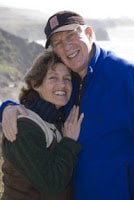 Do you think aging has made you less attractive? Do you have difficulty seeing yourself or your partner as sexy and desirable?
Do you think aging has made you less attractive? Do you have difficulty seeing yourself or your partner as sexy and desirable?
Then it’s time to challenge your own as well as society’s perception that only young bodies and unlined faces are sexy and beautiful. We need to accept – no, celebrate! – our wrinkles and rejoice in all the pleasure these bodies can still give us.
Let’s join together and practice rejecting society’s youth-oriented view of beauty, keeping ourselves fit so that we feel happy with our bodies, and keeping a loud, buoyant sense of humor!
I love my 71-year-old husband Robert’s face and body. I look into his vibrant blue eyes and I see the young man as well as the older man. The older man is no less sexy than the younger man must have been (I didn’t know him then). In fact, he’s more sexy, because he has learned how to live joyfully and love completely in ways that a young man can’t know until he has lived a full life.
I look in the mirror, where new wrinkles seem to appear weekly. I try to walk my own talk, accepting my own face as I accept Robert’s, telling myself these wrinkles are badges of living, laughing, and loving. I tell myself, this is the youngest I’ll ever be from now on!
I asked my 103-year-old great aunt what it felt like to be more than a hundred. She said, “I’m the same person I always was.”
So are we. Rather than trying to deny our aging — which is futile anyway — let’s celebrate it.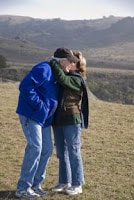
(Photos by Mitch Rice, Robert’s son, on Robert’s 71st birthday)
New England Journal of Medicine: Seniors having sex despite “bothersome problems”
When the news splashed all over the media today that older adults are, indeed, having sex, my first reaction was to laugh and say, “Duhhh!” The idea that senior sex is alive seemed to me as much a news story as the revelation that most people find feet at the end of their legs!
But there was much more to the story. “A Study of Sexuality and Health among Older Adults in the United States,” published today in the New England Journal of Medicine, was a major study of 3005 U.S. adults (1550 women and 1455 men) 57 to 85 years of age which revealed some fascinating facts and a few surprises:
The majority of older adults are sexually active and regard sexuality as an important part of life. The prevalence of sexual activity declines with age, yet a substantial number of men and women engage in vaginal intercourse, oral sex, and masturbation even in the eighth and ninth decades of life.The frequency of sexual activity reported by sexually active older adults (age 57+) is similar to the frequency reported among adults 18 to 59 years of age.The study reported that 78% of men 75 to 85 years of age, as compared with 40% of women in this age group, had a spousal or intimate relationship. Since women live longer, and on average, older men marry younger women, this disparity can be accounted for by the lack of available men for the older single women. The sexually active people in the oldest age group interviewed — 75 to 85 years of age — reported having sex at least two to three times per month, and 23% reported having sex once a week or more.About half of the sexually active men and women reported at least one “bothersome sexual problem,” and almost one third reported having multiple problems. The women’s most prevalent sexual problems were low desire, difficulty with vaginal lubrication, inability to climax, finding sex not pleasurable , and pain, usually during entry. The most prevalent sexual problems for men were erectile difficulty (14% of all men interviewed reported using medication or supplements to improve sexual function), lack of interest in sex, climaxing too quickly, anxiety about performance, and inability to climax. About one quarter of sexually active older adults with a sexual problem reported avoiding sex as a consequence.
Most surprising, given the extent of these problems that prevented sex from being satisfying or pleasurable, was this fact:
Only 38% of men and 22% of women reported having discussed sex with a physician since the age of 50.
The study suggests that the reasons for poor communication include the unwillingness of both patients and physicians to talk about sex and the gender and age differences between patients and their physicians.
Negative societal attitudes about women’s sexuality and sexuality at older ages may also inhibit such discussions.
When I give workshops and talks, both women and men frequently bring up physical problems that affect their sexuality and want me to provide a solution. I always say, “Please get a diagnosis from your doctor.” I emphasize that the problem may be caused by retreating hormones, or by an underlying health condition that you don’t know you have, or a medication, or interactions of medications. You can’t treat a problem until you know what’s causing it.
As the NEJM article states,
Sexual problems may be a warning sign or consequence of a serious underlying illness such as diabetes, an infection, urogenital tract conditions, or cancer. Undiagnosed or untreated sexual problems, or both, can lead to or occur with depression or social withdrawal. Patients may discontinue needed medications because of side effects that affect their sex lives, and medications to treat sexual problems can also have negative health effects, yet physician–patient communication about sexuality is poor.
I invite your comments!

